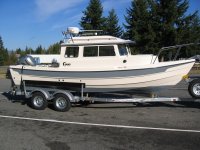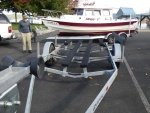flapbreaker
New member
- Joined
- Jan 26, 2005
- Messages
- 878
- Reaction score
- 0
- C Dory Year
- 2006
- C Dory Model
- 22 Cruiser
- Vessel Name
- Playin' Hooky
I read the first thread in this topic area regarding tongue weight but still have question.
I took my boat by a state operated truck scale to get an idea of her weight. I put both axle's on the scale and it read 3950 lbs. I was actually surprised since I didn't have much fuel/water or gear but I guess that's what she weighs. Then and put just the jack wheel on the scale and came up with 550 lbs :shock: That's quite a tongue weight. Far more than the recommended 5-7% I've seen mentioned. So I moved the winch arm back 2 inches while the boat was off the trailer. When I re-weighed I got the exact same weight's for both the axle weight and tongue weight :?: I guess I don't understand how the tongue weight didn't change at all?
Basically I need to level the trailer since it's tandem axle. I could simply get a 2 inch higher hitch but if the tongue weight is that far off I should fix that first and then see if I need the hitch height/ new rear shocks ect...
What do you guys make of this? Should I try and move the axle's forward?

I took my boat by a state operated truck scale to get an idea of her weight. I put both axle's on the scale and it read 3950 lbs. I was actually surprised since I didn't have much fuel/water or gear but I guess that's what she weighs. Then and put just the jack wheel on the scale and came up with 550 lbs :shock: That's quite a tongue weight. Far more than the recommended 5-7% I've seen mentioned. So I moved the winch arm back 2 inches while the boat was off the trailer. When I re-weighed I got the exact same weight's for both the axle weight and tongue weight :?: I guess I don't understand how the tongue weight didn't change at all?
Basically I need to level the trailer since it's tandem axle. I could simply get a 2 inch higher hitch but if the tongue weight is that far off I should fix that first and then see if I need the hitch height/ new rear shocks ect...
What do you guys make of this? Should I try and move the axle's forward?


